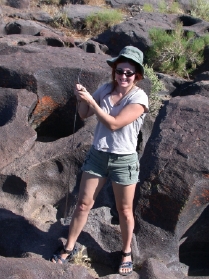|
|
 |
Present Address: Ph.D. Student (Astrid Kodric-Brown and Paul J. Watson, coadvisors) Department of Biology University of New Mexico MSC03 2020 Albuquerque, New Mexico 87131-0001, USA Email: andres@unm.edu |
|
|
 |
Present Address: Ph.D. Student (Astrid Kodric-Brown and Paul J. Watson, coadvisors) Department of Biology University of New Mexico MSC03 2020 Albuquerque, New Mexico 87131-0001, USA Email: andres@unm.edu |
Thesis Research
My research seeks to determine why strict herbivory (plant-eating) evolves in lizards. My study is a laboratory investigation that tests the effects of diet switching (herbivory to carnivory, then back to herbivory) on the desert iguana, Dipsosaurus dorsalis, a locally occurring, herbivorous, iguanid lizard. My experiments include estimating the digestive efficiencies of desert iguanas fed one of three diet treatments before and after diet switching. The effects of diet switching on the endosymbiont community (microorganisms in the hindgut of the lizards that help digest plant material via fermentation) will be analyzed using molecular techniques. The hypothesis I am testing predicts that in an environment where insects are only available seasonally, the benefit of switching to a diet of insects is outweighed by the decline in digestive efficiency (following switching back to eating plants) caused by the disruption to the endosymbiont community associated with eating insects.
Download a copy of my full research proposal here [Andres MS Thesis Proposal].
 |
Awards and Honors Research Funding Professional Presentations
Peer-Reviewed Publications
Testing the cost of diet switching as a mechanism for the evolution of herbivory.
Testing the cost of diet switching as a mechanism for the evolution of herbivory.
Testing diet switching as a mechanism for the evolution of herbivory in lizards.
Testing diet switching as a mechanism for the evolution of herbivory in lizards.
Testing diet switching as a mechanism for the evolution of herbivory in lizards.
Testing diet switching as a mechanism for the evolution of herbivory in lizards.